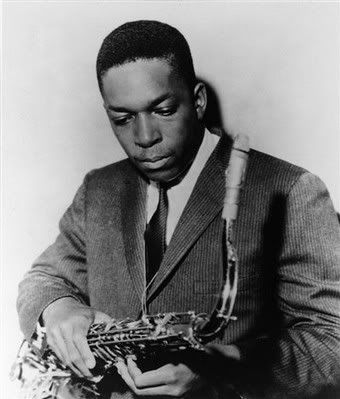cross-posted from The Dream Antilles
Last night I found myself on a Continental 757 heading again for Newark, city of my birth, one of those tough places, a gritty, rusty place I return to repeatedly.
To my amazement, one of the audio selections available on the flight was John Coltrane’s seminal 1964 recording “A Love Supreme.” This album is one of Coltrane’s greatest works, and it is repeatedly listed as one of the greatest jazz albums of all time. Why was I amazed? True, it was the 48th album of the 50 available. It should have been first. True, it was the 2002, redigitalized version (I am such a snob). It should have been the original vinyl. But forget all of that, there it was. I hadn’t listened to it from beginning to end without interruption in more than 30 years. So yesterday I listened again to “A Love Supreme.” What a delight.
The recording has four parts: “Acknowledgement” (which contains the famous Love Supreme, Love Supreme mantra), “Resolution”, “Pursuance”, and “Psalm.” The recording (can we still call it an album or make believe it’s classical and call it a suite?) is the culmination in many ways of what Coltrane began in Giant Steps and Chasing the Trane. It’s modal. It’s free. It’s totally inventive. It’s astonishing. “Psalm,” the final part, the part I love most, is what Coltrane calls a “musical narration” of the devotional poem he included in the liner notes. In other words, Coltrane “plays” the words of the poem, but does not actually speak them. In this you can hear the sounds of devotional sermons of African-American preachers, Jewish and Muslim chanting, African singing, sounds of the street, the hum of Newark or Philadelphia, the voices from Coltrane’s heart. Coltrane’s solo ends with him playing the words “Elation. Elegance. Exaltation. All from God. Thank you God. Amen.” I say, “Amen, Amen, Amen.”
What a striking, incredible performance. How can it be that 44 years after it was recorded, “A Love Supreme” remains so fresh, alive, exciting, expressive, deep?
A Love Supreme was recorded one December evening in Rudy Van Gelder’s legendary studio in Englewood Cliffs, N.J. Pianist McCoy Tyner remembers the unusual, almost magical atmosphere surrounding the session. “Rudy that day dimmed the lights in his studio. I’d never seen him do that and it sort of set an atmosphere. There was just something very, very special about that particular session.”
Drummer Elvin Jones says Coltrane “never wrote out any music for us. When he played we more or less had to imagine, or feel, how to interpret the song. And it got to the point where I felt I was almost part of his mind, almost telepathic in a way.”
The quartet, which also included bassist Jimmy Garrison, needed little more than the seed of a melodic idea when it hit the studio. Tyner adds: “We had been playing some of that music and we didn’t know what it was going to be until we got into the studio. And then it all came together.”
Coltrane constructed the suite’s main theme around a simple four-note pattern – based on the words “a love supreme.”
The playing of the quartet on this recording is unbelievably wonderful. From the very first sound of a gong on “Acknowledgement”, through the initial four notes Garrison plays on bass, through incredible drum solos by Elvin Jones (how can he do all of that?), through McCoy Tyner’s unbelievably complex piano dexterity, to Coltrane’s final, mind altering solo, the quartet at once plays together and individually, and it stretches the music out beyond anything rote, beyond the anticipated, beyond the possible, into the ionosphere. Remember please that this is music from the era when jazz players were justifiably revered for their genius. The skilled playing, the inventiveness of the improvisation, the faith of the players in each other, their mutual support of the themes culminates in my head shaking slowly, side to side, bliss, joy, ecstacy, nirvana, Om ah Hum.
As I fly toward Newark, my birthplace, with this quartet in my ears, I remember the Newark of the ’60’s. The riot. The killing. The incessant crimes. The discrimination, poverty, unemployment, oppression, racism. The Projects. The desperation. I can hear all of that in this music, welling up, speaking out, clenching its fist, and then opening it again in transcendence. And I wonder, “What would Coltrane have made of Obama?”

